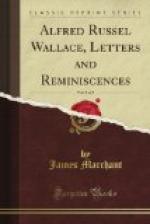During all the face exhibitions singing had to go on to a rather painful extent.[60]
A Dr. Purdon was present, an Army surgeon, who has been much in India, and seems a very intelligent man. He seemed very intimate with the family, and told us he had studied them all, and had had Miss Cooke a month at a time in his own house, studying these phenomena. He was absolutely satisfied of their genuineness, and indeed no opportunity for imposture seems to exist.
The children of the house tell wonderful tales of how they are lifted up and carried about by the spirits. They seem to enjoy it very much, and to look upon it all as just as real and natural as any other matters of their daily life.
Can such things be in this nineteenth century, and the wise ones pass away in utter ignorance of their existence?—Yours very sincerely,
ALFRED R. WALLACE.
* * * * *
At the Glasgow Meeting of the British Association in 1876, Prof. (now Sir) W.F. Barrett read a paper “On some Phenomena associated with Abnormal Conditions of Mind.” Wallace was Chairman of the Section in which the paper was read, and a vigorous controversy arose at the close between Dr. Carpenter, who came in towards the end of the paper, and the Chairman. The paper set forth certain remarkable evidence which Prof. Barrett had obtained from a subject in the mesmeric trance, giving what appeared to be indubitable proof of some supernormal mode of transmission of ideas from his mind to that of the subject. The facts were so novel and startling that Prof. Barrett asked for a committee of experts to examine the whole question and see whether such a thing as “thought transference,” independently of the recognised channels of sense, did really exist. This was the first time evidence of this kind had been brought before a scientific society, and a protracted discussion followed. The paper also dealt with certain so-called spiritualistic phenomena, which at the time Prof. Barrett was disposed to attribute to hallucination and “thought-transference.” The introduction of this topic led the discussion away from the substance of the paper, and Prof. Barrett’s plea for a committee of investigation on thought-transference fell through. So strong was the feeling against the paper in official scientific circles at the time, that even an abstract was refused publication in the Report of the British Association, and it was not until the Society for Psychical Research was founded that the paper was published, in the first volume of its Proceedings. It was the need of a scientific society to collect, sift and discuss and publish the evidence on behalf of such supernormal phenomena as Prof. Barrett described at the British Association that induced him to call a conference in London at the close of 1881, which led to the foundation of the Society for Psychical Research early in 1882.




